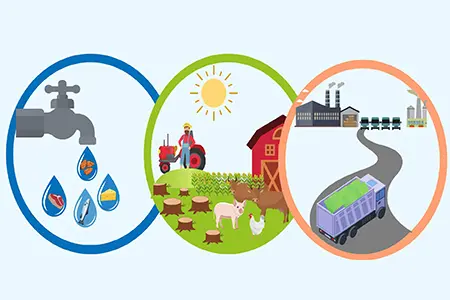The link between diet and disease has long been a topic of interest and research in the world of public health. With the rise of processed foods in our modern society, there has been increasing concern about the potential health consequences of consuming such products. In particular, the consumption of processed meats has been a major focus of research, with numerous studies examining the impact on cancer risk. This topic has gained particular attention due to the alarming rise in cancer rates worldwide. According to the World Health Organization (WHO), cancer is projected to become the leading cause of death globally by the year 2030. In light of this, it is crucial to understand the potential impact of processed meats on cancer risk, and to consider the implications for public health and individual dietary choices. This article will delve into the current research and evidence surrounding the link between processed …
Take Action
Meat consumption has been a staple in human diets for centuries, playing a significant role in cultural and social practices worldwide. Despite being a primary source of protein and essential nutrients, the consumption of meat has also been a topic of debate and controversy. From religious beliefs and traditional customs to economic factors and emerging dietary trends, there are various cultural and social factors that influence our attitudes and behaviors towards meat consumption. Understanding these factors is crucial for gaining insights into the diverse and complex relationship between humans and meat. By exploring the cultural and social influences on meat consumption, we can shed light on the different perspectives and practices surrounding this dietary choice. In this article, we will delve into the fascinating world of meat consumption, examining the cultural and social factors that shape our attitudes towards this controversial food. By examining these factors, we can gain a …
Veganism has long been associated with ethical eating habits and animal rights activism. However, in recent years, there has been a growing recognition of the intersectionality between veganism and social justice. This idea suggests that the fight for animal welfare and the fight for human rights are interconnected and cannot be separated. As more individuals adopt a vegan lifestyle, they are also becoming more aware of the inequalities and injustices that exist within our society. This has led to a shift in the conversation surrounding veganism, from solely focusing on animal rights to also encompassing issues of race, class, and gender. In this article, we will explore the intersectionality of veganism and social justice, and how these two movements can work together towards a more compassionate and equitable world. We will delve into the ways in which animal agriculture perpetuates systems of oppression and how veganism can be a form …
The debate surrounding animal rights and welfare in the meat industry has been a contentious and ongoing issue. As the demand for meat products continues to rise, so does the scrutiny on the treatment of animals in the meat production process. With animal activists and organizations calling for more ethical and humane practices, the meat industry has come under pressure to address these concerns. In recent years, there have been numerous exposés and investigations that have shed light on the often inhumane and cruel treatment of animals in factory farms and slaughterhouses. This has sparked a global conversation on the moral implications of the meat industry and the ethical treatment of animals. While some argue that animals should have the same rights as humans, others believe that the consumption of meat is a natural and necessary part of human survival. In this article, we will delve into the complex and …
In recent years, there has been a growing interest in the concept of sustainable living. As our world continues to face environmental challenges such as climate change and depletion of natural resources, many individuals are looking for ways to reduce their carbon footprint and make more eco-friendly choices. One powerful way to promote sustainability is through plant-based nutrition education. By educating individuals on the benefits of incorporating more plant-based foods into their diet, we not only improve our own health but also contribute to a more sustainable future for our planet. In this article, we will delve deeper into the connection between sustainable living and plant-based nutrition, exploring the impact of our food choices on the environment and our health. We will also discuss the importance of promoting plant-based nutrition education and the ways in which it can be integrated into our daily lives. With a professional tone, this article …
In recent years, there has been a growing global movement towards reducing meat consumption, driven by concerns about the environment, animal welfare, and personal health. While the idea of cutting back on meat may seem daunting for some, the potential economic benefits of such a shift cannot be ignored. As the demand for meat continues to rise, so does its impact on our planet and economy. In this article, we will explore the economic impact of reducing meat consumption and why it is not only necessary for the sustainability of our planet but also feasible for human society. From the cost savings on healthcare to the potential for job creation, we will examine the potential benefits and challenges of transitioning to a plant-based diet. By understanding the economic implications of reducing meat consumption, we can better assess the feasibility of this dietary shift and its potential impact on our society. …
Livestock farming has long been a fundamental aspect of human civilization, providing a significant source of food, labor, and economic stability. However, as global demand for meat and dairy products continues to rise, concerns about the environmental impact of this industry have come to the forefront. The production of livestock, particularly cattle, is a major contributor to greenhouse gas emissions, deforestation, and water pollution. This has led to a growing movement towards plant-based diets and alternative protein sources, as well as calls for more sustainable and ethical farming practices. In this article, we will examine the environmental consequences of livestock farming and the implications it has for human diets. We will delve into the various ways in which this industry impacts our planet and discuss the potential solutions and changes that can be made to mitigate its negative effects. By exploring the complex relationship between livestock farming and the environment, …
In today's modern society, meat consumption has become a cultural norm and a staple in many diets. From fast food chains to fine dining restaurants, meat is often the star of the show. However, with the rise of health-conscious individuals and the increasing popularity of plant-based diets, many are beginning to question the effects of excessive meat consumption on our health. While meat may be a source of protein and essential nutrients, studies have shown that consuming too much of it can have negative impacts on our well-being. In this article, we will delve into the health risks associated with excessive meat consumption and explore why humans can thrive without it. By examining both the physical and environmental effects, we will discover the importance of moderation and balance in our diets. As we navigate through the complexities of the meat industry and the human body, it is crucial to approach …
Iron deficiency is a common concern for individuals who follow plant-based diets, as meat is often seen as the primary source of this essential nutrient. However, recent studies have shown that it is possible to meet the recommended daily intake of iron without consuming animal products. Despite this evidence, there are still many misconceptions surrounding iron deficiency in plant-based diets, leading to hesitation and skepticism among those considering a shift towards a more plant-based lifestyle. In this article, we will debunk these myths and shed light on how humans can obtain sufficient amounts of iron while following a plant-based diet. Through a thorough analysis of scientific research and expert opinions, we aim to provide a comprehensive understanding of iron deficiency and its relationship to plant-based diets. Furthermore, we will discuss practical and accessible ways to incorporate iron-rich plant-based foods into daily meals to ensure optimal iron intake. It is time …
As the world becomes increasingly health-conscious and environmentally aware, the popularity of plant-based diets has skyrocketed. Many individuals are now choosing to adopt a plant-based lifestyle, either for ethical, environmental, or health reasons. And with this shift, there has been a growing interest in exploring the culinary diversity of plant-based foods and their potential to satisfy human palates. While traditionally, plant-based diets were often seen as boring and bland, recent advancements in food technology and creative cooking methods have led to a wide range of delicious and flavorful plant-based options. In this article, we will delve into the world of plant-based cuisine and uncover the endless possibilities that exist beyond the traditional meat-centric diet. From mouth-watering meat substitutes to vibrant and nutrient-dense fruits and vegetables, we will explore the diverse range of plant-based foods and their potential to tantalize taste buds and satisfy even the most discerning palates. Join us …











